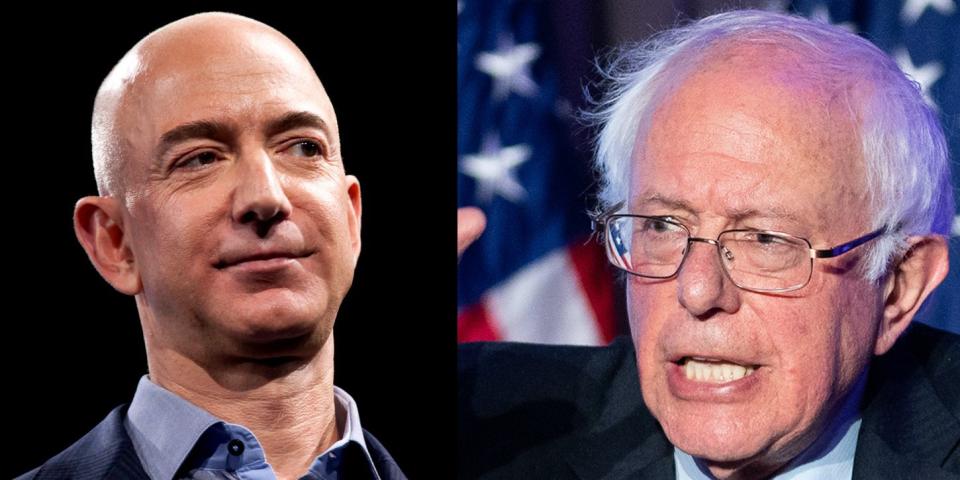The real reason why Amazon is raising the minimum wage
Amazon, the second largest private employer in the U.S., is raising the minimum wage for its full-time and temporary workers to $15 per hour.
The decision comes at a time when the e-commerce giant has been under mounting pressure for low wages and draconian working conditions. Analysts see it as a good public relations move and believe the economics behind it makes sense, especially before another busy holiday hiring season.
Pressure from politicians and the public

In a statement on Tuesday, Amazon (AMZN) admitted it has taken recent attacks into consideration. “We listened to our critics, thought hard about what we wanted to do, and decided we want to lead,” said Jeff Bezos, Amazon founder and CEO.
Sen. Bernie Sanders, one of Amazon’s most prominent critics, has repeatedly called out Bezos. Sanders said many Amazon employees are receiving federal benefits like food stamps while working for “the wealthiest people in the U.S.” Last April, he introduced a bill that called to raise the federal minimum wage to $15 an hour.
On Tuesday, Sanders applauded Amazon’s announcement and said he looks forward to working with Bezos to push the rise of the federal minimum wage.
As consistently negative media reports on Amazon warehouse workers have raised public concerns, Anthony Chukumba, Loop Capital Markets managing director, sees the wage increase as a “public relations victory.”
“We also think this move could help to alleviate growing animosity between the White House and Amazon, a frequent target of President Trump,” wrote Chukumba in a note on Tuesday.

Employee unionization
The pressure doesn’t just come from outside — Amazon employees have been trying to organize and voice their unrest, too. But Amazon has developed a strict management system to contain complaints and make it futile for employees to organize and form unions. A leaked training video obtained by Yahoo Finance teaches Amazon managers to identify “early warning signs” of unionization.
In August, some Whole Foods Markets employees called for unionization, citing disappearing benefits and deteriorating corporate culture since Amazon acquired the premium grocery chain in August 2017. One week later, Whole Foods CEO John Mackey said the company would bring its stock options back.
While the minimum wage increase is good news for workers in Amazon and its subsidiaries, like Whole Foods, it’s important to note that at the same time Amazon is removing its Restricted Stock Unit (RSU) program. Employees used to receive Amazon shares (AMZN) after working there for a certain period of time. In a previous public response to Sanders, Amazon said, “the average hourly wage for a full-time associate in fulfillment centers, including cash, stock, and incentive bonuses, is over $15 an hour”. Now with only the hourly wage, the benefits offered to current full-time employees are limited.
Gearing up for holiday hiring

The raise is also likely to make Amazon more competitive in a tightening labor market, as retailers gear up for holiday hiring season. Amazon had trailed its rivals. The hourly average wage for a warehouse job, according to Salary.com, a compensation data website, is $15. Amazon workers usually earned $11-$13 an hour before the raise.
Last year, Amazon hired 120,000 workers in the U.S. during the holiday season. The company hasn’t announced its hiring plans this year, but expects to hire more than 100,000 seasonal associates. Since temporary workers benefit from the higher hourly wage, the raise will likely help Amazon lure workers.
Amazon said the effect of the additional labor expense will be incorporated into the company’s earnings guidance. The company’s stock was moving slightly higher Tuesday, trading at over $2,000.
Neil Saunders, managing director of GlobalData Retail, said improving profitability and growing sales will help to offset the rising labor cost. This puts pressure on Walmart (WMT), another big-box retailer, which boosted the minimum wage to $11 an hour in May, following Trump’s tax cut.
“It is also the case that Amazon gets something of a free pass on profit levels from investors, so it is able to manage market expectations,” said Saunders. “The same cannot be said for other retailers, many of which are under increasing economic pressure to increase wages and benefits.”
Do you work for Amazon/Whole Foods? We want to hear how you think of the raise. Drop us a line via [email protected] or follow Krystal on Twitter.
Read more:
Amazon bought Whole Foods a year ago. Here’s what has changed
